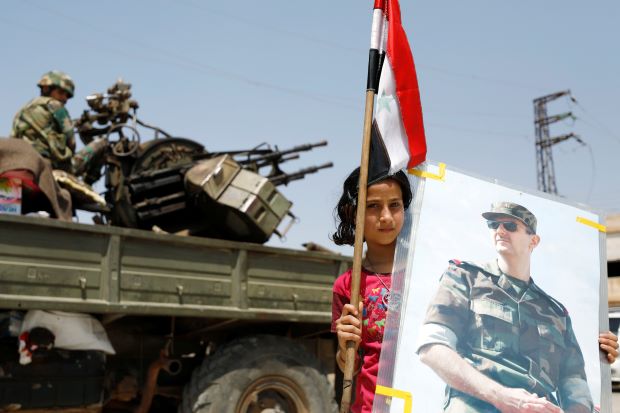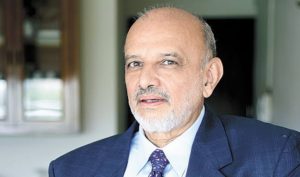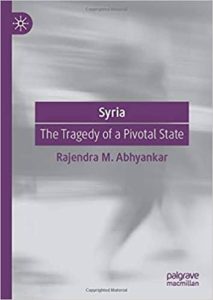Ten years of the Syrian war: The Tragedy of a Pivotal State

This week marks the tenth anniversary of the Syrian civil war. Ambassador Rajendra M. Abhyankar, who has served as India’s envoy to Syria, has recently authored the book “Syria: the Tragedy of a Pivotal State”. In this interview with Aditi Bhaduri he discusses his book and explains some aspects of the Syrian war. Excerpts:
Why a book on Syria?
Well, the first reason is [that] I was posted in Syria from 1992-96 and thereafter I regularly visited Syria when I was Secretary later in the Ministry of external affairs. So I’ve had a fairly close relationship with various people in Syrians. The most important thing however is that the Syrian civil war, which has completed a decade, is the first time where four out of five permanent members of the UN Security Council are on the ground and also every regional power of the Middle East was on the ground.

There were also, though not anymore now, 1000 radical Islamist groups that were fighting Assad and each one was backed by one of these powers.
It was a most unusual situation where because of the presence of the four permanent members of the UN Security Council on the ground no real action was ever taken to seriously stop the conflict.
And of ccourse, the most important aspect, 11 million people, almost half of Syria’s population displaced, with 5 million displaced outside Syria’s borders as refugees mostly in Turkey, Lebanon and Jordan. And this could be the new way ….. to start a new war, where everybody is fighting in one country rather than a world war where geographically speaking people are fighting all over the world.
That’s why a book on Syria was important apart from my personal interest.
The title of the book is “Syria: Tragedy of a Pivotal State”. What is a pivotal state?
A ‘pivotal state’ has had a meaning which has changed over the years. But basically let us say at this time a pivotal state is a state which determines the tenor of the entire region in which where the state is located.  Which means it becomes extremely important what happens in a pivotal state to understand what will happen in the rest of the region.
Which means it becomes extremely important what happens in a pivotal state to understand what will happen in the rest of the region.
 Which means it becomes extremely important what happens in a pivotal state to understand what will happen in the rest of the region.
Which means it becomes extremely important what happens in a pivotal state to understand what will happen in the rest of the region.Earlier, during the communist rule in USSR and other places, a pivotal state was one which you had to prevent from becoming a communist state because if that state became communist it that would make all the neighbouring states become communist.
So a pivotal state is one which influences other states in the region.
And “tragedy” because what we see happening in Syria is a tragedy.
What according to you was a defining moment in the Syrian war?
The Syrian war was the most extreme response to the so called Arab spring which afflicted the entire region from 2010.
The effect from December 2010 when it started in Tunisia and then went all along the ..north African coast to the Gulf, the leaders, whether it was in Tunisia or Egypt leaders who had been in power for 40-50 powers, had to leave at the strong instance of the movement of the people.
It was in Syria that you had the first strong negative reaction to the so called Arab Spring.
It started in March at a place called Daraa, on the border with Syria and Jordan,…. where children who wrote on various walls “Doctor, it’s your time”. Now doctor referred to Bashar Assad, who is an optician. And those children were really brutalized by the forces.
So I think that was a very definig moment. Because what could have been a peaceful protest slowly gathered momentum and escalated on both sides in terms of violence till you have what is now after ten years.
The second definig moment, although it has not had it’s full impact l, is that for the first time in 2015 all the countries in the UN Security Council unanimously voted in UNSC resolution 2254 which actually lays down a blueprint on how the whole Syrian situation could be brought back to normal. So UNSC Resolution 2254 of 2015 is a guideline on how and what needs to be done.
So that was the second definig moment that in the midst of all this in 2015 all UNSC members realised that something has to be done.
Not all has been realised but ..if you compare….there was no unanimous UNSC resolution during the Iraq war or for Afghanistan, so it’s quite a unique in spite of what was going on in the country.
Syria is the inheritor of an ancient unbroken civilization as you write in your book. It’s people are very cultured and even after the introduction of Arabian and Islam Syria continued to be a pluralistic, secular state. How do we reconcile this with the very brutal violence witnessed in the course of the last ten years.
You are right that the Syrians are highly cultured and it’s an old civilization.
It [the brutality] happened because if one looks at it a little historically, if you look at Damascus, which determines what happens in Syria, and Damascus is, despite access to the sea, surprisingly… an inward looking city, not an outward looking one.
Secondly, because of this tremendous ferment which continued over the centuries as historically Damascus has been a place people came from all over the region to settle their quarrels in. So that has been the culture of Damascus, with all the foreign influence coming in to use this whole land, which is called the Billad e Sham, the Land of the Sun, to settle their quarrels. And that is how despite the ancient culture all this happened.
Thirdly, all three religions – Islam, Christianity, and Judaism – were nurtured in Syria more or less at the same time and these religions have not necessarily always been okay with each other.
Finally, in the present situation, Syria has unfortunately become the target of a large number of global and regional powers to achieve their own ends. None of which has been achieved after ten years and tremendous loss to the Syrian people.
India’s PR to the UN T.S. Trimurti has called for sanctions on Syria to be lifted. How detrimental have the sanctions been to Syria?
Sanctions have been very detrimental to the ordinary Syrians. When I was in Damascus last in 2019 I found that things have become incredibly expensive. The value of the Syrian pound has decreased tremendously so people are facing many difficulties. In spite of it, I found that the government is, as it has always done, been providing things like bread and milk to the people at a very nominal price, medical aid though most hospitals have been destroyed.
Some construction work has started but whether it’s being done in an impartial manner or not is the real point. But ordinary Syrians are suffering mainly because of the sanctions.
And now with the Ceasar Act which President Donald Trump introduced which makes it punishable for any country which gives assistance to Syria. This is ridiculous. The idea [behind the sanctions] was meant to force the Syrian government to fall in line with the plan in UNSC resolution 2254. But then how do you stop Turkey [which in 2019 invaded northern Syria and occupied Idlib] ? Instead of the US actually stopping it, President Trump actually gave [Turkey] a free check to do this.
So it’s not over yet. But I do believe that finally after ten years all the countries which were backing different opposing groups [in the Syrian war] have realised that in ten years have not been able to do anything and President Assad is still there. That probably explains why countries like UAE and Egypt want Syria reinstated in the Arab League.
The change of heart is not because of altruism but because the focus now is on Iran. That is why we now find that six Arab countries now have diplomatic relations with Israel, for different reasons, but the common factor is Iran.
That is why ….[Arab states think] that if we can’t get rid of [President] Assad, then let’s have good relations with him so that we don’t leave the entire field to Iran, which has been helping Syria since 2013, and the Russians since 2015.
What would it take to bring about an overall settlement in Syria?
There are two important issues here.
Any settlement will require a new political dispensation. That is it will require a new political constitution which will lay down how the country will be governed and which will also include in it on what time frame will President Assad’s role will slowly be reduced.
Fortunately, after lot of false starts, in January this year there was a meeting of different stakeholders in Geneva on discussing a viable constitution which will be representative, and inclusive and take care of different interests. What is important to remember is that Syria has nearly 70 per cent Sunnis, and the country has been run for the last forty years by the Assad family who are Allawites, which is a branch of the Shi’i.
Also the constitution when is agreed upon, it has to be guaranteed by all the five permanent members. Without that, it’s not going to work. Like the case of Cyprus, where all 5 permanent members became the guarantors of it’s constitution.
So all those various aspects will have to be taken together in a constitution. So that some kind of what’s called con- socialization happens and people start to learn to live together again. This is what the last chapter of my book talks about and gives certain [suggestions] on what needs to be done.
The second most important thing is that you need to reconstruct the whole country.
I was last in Syria in May 2019 because I could not travel last year. So I would say that
Damascus is okay though there are problems but the rest of the country is devastated and estimates [for reconstruction] range from 350 to 700 billions of dollars.
I take the larger amount and no single country or institution can provide that. Which means the same countries, especially the permanent members [ of the UN Security Council] And the OECD group who have been involved in one way or the other with the destruction now have to pay up to get the country back on the rails.
There are if course other issues like people who have disappeared will have to be found, people who are unaccounted for, and several other [issues]. I have mentioned the two most important ones.